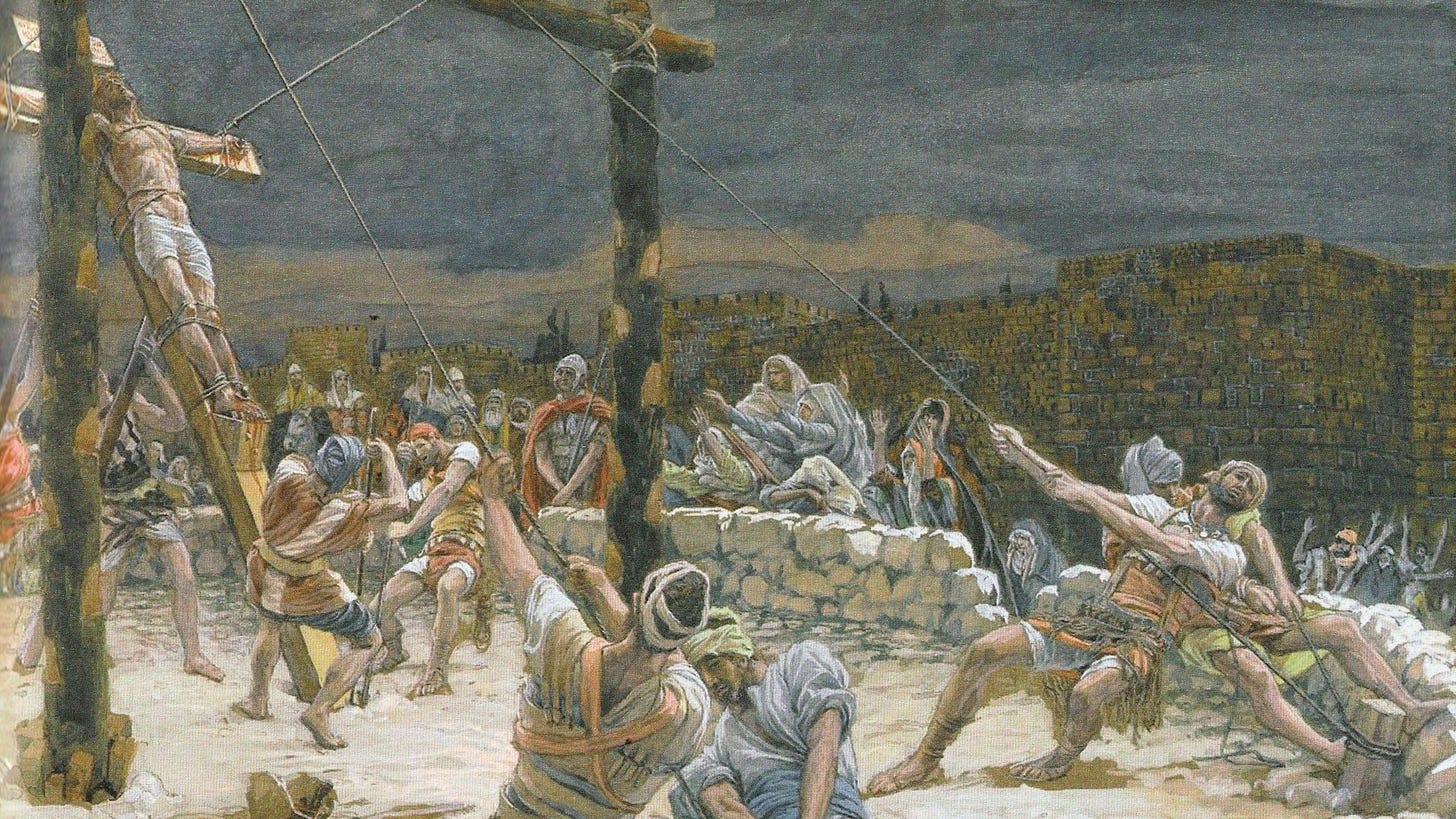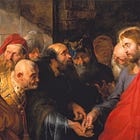Being 'lifted up' on the Cross was Christ's glory and desire
Why was the Cross the true throne of Christ the King?

Why was the Cross the true throne of Christ the King?
Editor’s Notes
In this Part, Fr. Coleridge tells us…
How Christ speaks of His death as exaltation and irresistible kingship.
That the Cross is the throne from which He draws all hearts to Himself.
Why His final words on Palm Sunday urged men to believe while the light still shines.
He shows us that to reject the lifted Christ is to walk into darkness willingly.
There is so much material that we could share during Holy Week. Rather than trying to provide it all, we will instead focus on how and why Christ’s triumphal entry into Jerusalem provides a key to the whole of his blessed and glorious Passion.
The Procession of Palms
Passiontide, Part I, Chapter II
St. Matt. xxi. 14-17; St. Mark xi. 1-11; St. Luke xix. 29-44; St. John xii. 12-18.
Story of the Gospels, § 132
Burns and Oates, London, 1889
Headings and some line breaks added.
Sung on Palm Sunday
Our Lord casts reserve aside and enters Jerusalem as Christ the King
What was it about Palm Sunday that most surprised the Pharisees?
Being 'lifted up' on the Cross was Christ's glory and desire
The lifting up from the earth
‘And I, if I be lifted up from the earth, will draw all things unto Myself. Now this He said, signifying what death He should die.’
These words seem to have been understood by the crowd as having reference to our Lord’s death, for they proceed at once to put the question to Him as if they so understood them.
‘The multitude answered Him, We have heard out of the Law that Christ abideth for ever, and how sayest Thou, The Son of Man must be lifted up? Who is this Son of Man?’
Some have thought that the words of the multitude imply that our Lord had said something more, both about the Son of Man, and about His being lifted up in death. It is well known that the expression the Son of Man is but seldom used in this Gospel of St. John, in comparison with the other Gospels, but it has been used just before this passage, when our Lord had said that the hour was come in which the Son of Man was to be glorified. It seems to have been a common phrase in the mouth of our Lord, and the infrequency of its occurrence in this particular Gospel may be accounted for in more ways than one.
But it is also certainly remarkable that the words of the multitude in this place seem to show us that St. John has given us just enough of what was now spoken to suit the purpose which he had in view in the narrative, and no more. It is clear that they must have understood our Lord to be speaking of His death. It is not absolutely necessary to suppose that some words are omitted, because our Lord had on other occasions used the same image of His death. He had said to Nicodemus:
‘As Moses lifted up the serpent in the desert, so must the Son of Man be lifted up, that whosoever believeth in Him may not perish, but have life everlasting.’1
And again, in His great teaching in the Temple during the feast of Tabernacles, and therefore not very long before this time, He had said to His enemies:
‘When you have lifted up the Son of Man, then shall you know that I am He.’2
It is possible that we have very imperfect notions of the manner in which the words of our Lord were caught and treasured up by those who heard Him. Thus they may have fixed themselves in the memory even of men who were perplexed and imperfect in their faith. So that this expression of our Lord about lifting up, in the sense of death, may have been known as one that He was continually using on occasions of which we have no direct record.
To the common people it may have signified only that He was to be removed in some way or other. For they seem to have understood that what He said was contradictory to the common ideas concerning Christ, Who was to abide for ever. They did not understand the full meaning of the favourite expression of the Son of Man, and much less therefore would they easily comprehend the truth of the Incarnation of the Son of God and His sacrifice of Himself for the sins of the world.
This our Lord proceeds very shortly to speak of, though His words are very few, and refer chiefly to the danger of their losing the short opportunity which still remained to them of His presence among them as their Teacher. For the Holy Week had already begun, and the few hours of His teaching in the Temple would be all that remained of the blessed time when they could listen to the words of His mouth.
Drawing all men to Him
‘And I, if I be lifted up from the earth, will draw all things unto Myself.’
The words seem to be suggested by what has been said before about the prince of this world being cast out, as if it were meant that our Lord Himself was to become the true Prince and King of the world, in the place of the usurper who had been cast out. They mean, then, that in His Sacred Humanity our Lord is the true King of the world, as well as in His Divine Nature as God, One with the Father and the Holy Ghost. And they express also the truth that in His Sacred Humanity our Lord has a power of attractiveness which conquers the hearts of men, who become His servants not simply on account of the majesty of His Godhead, but by the love which wins their hearts and entrances their affections.
‘Yet a little while, and the light is among you. Walk while you have the light, that the darkness overtake you not. And he that walketh in darkness knoweth not whither he goeth. Whilst you have the light, believe in the light, that you may be the children of the light. These things Jesus spoke, and He went away and hid Himself from them…’
… going out, as we know, to Bethany, and showing Himself openly only in the day, and when the people were present, on account of the danger with which His steps were haunted from the Chief Priests. Their hour was not yet come, though it was at hand, and it was not in the counsels of God that it should be anticipated.
Close of the day
Thus, at the close of this the first day of His public presence in Jerusalem, our Lord could retire to Bethany and leave the effect of what had passed in these few hours, to work upon the minds both of the people and of His enemies. There can be little doubt that few of all the days of His sacred Ministry could have left deeper traces on the public mind.
The Chief Priests were startled and thoroughly alarmed by the events of the day. Our Lord had fulfilled a great prophecy, which they acknowledged to belong to the Messias, in the most astonishing manner.
The King had come, meek, and riding upon an ass, and had filled the whole city with the magnificence of His Presence. He had accepted the homage of the multitudes as the Son of David, and when asked to rebuke His followers He had justified and praised them instead.
But to Him the great act of the day was the offering of Himself as the victim to His Father’s justice as the sacrifice for the sins of the world.
This had been a matter of great rejoicing to the Sacred Heart, which had had Its sorrows also to bear in the obduracy of His enemies, their cavils at the words of the crowd and at the praises of the little children, for that kind of carping fault-finding spirit left little hope of their own conversion. He had also to weep over the beloved city of Jerusalem, and the thoughts of His own triumph had been blended into those of the guilt which was to bring about its doom.
Another consolation to the Sacred Heart would have been the application of the Gentiles to be allowed to see Him. He had strictly kept to the rule of this one mission from the Father in not welcoming them openly. But all the more would His Heart rejoice in the promise which that application involved of the future glories of the Gentile Church.
Prophecy of Zacharias
In the passage of Zacharias which is fulfilled by the entry into Jerusalem, there is much that follows on the words which the Evangelists quote, which seems to refer to the universal extension of His Kingdom, especially among the Gentiles. Nor is it at all certain, although some modern critics do not follow the Fathers in finding in the same passage some words which imply His triumph even in the world beyond the grave, that the passage has not that meaning.
‘Thou also by the Blood of Thy testament hast sent forth Thy prisoners out of the pit wherein is no water. Return ye to the stronghold ye prisoners of hope, I will render thee double as I declare today.’3
In any case, the day had been full of triumphs in His love for souls, far dearer to the Sacred Heart than the acclamations of the simple and fickle multitude.
One thing was quite settled now. The attitude of our Lord was perfectly different from that which He had hitherto assumed towards the Chief Priests and Pharisees.
There had been speculations as to His coming to the feast at all. Now He had come up in a royal manner.
It was thought that He might hide Himself. Now there was no appearance in Him of any avoidance of publicity.
He had spoken before enigmatically about His claims. Now there was no doubt about His claim to be a King.
And the marvellous power that was in Him was shown conspicuously by the fact that no one had dared to touch Him or to interfere with Him, and that His most powerful enemies had shrunk back instinctively before Him.
Fin.
Subscribe to never miss an article:
The Procession of Palms
Our Lord casts reserve aside and enters Jerusalem as Christ the King
What was it about Palm Sunday that most surprised the Pharisees?
Being 'lifted up' on the Cross was Christ's glory and desire
Read Next:
Here’s why you should subscribe to The Father Coleridge Reader and share with others:
Fr Coleridge provides solid explanations of the entirety of the Gospel
His work is full of doctrine and piety, and is highly credible
He gives a clear trajectory of the life of Christ, its drama and all its stages—increasing our appreciation and admiration for the God-Man.
If more Catholics knew about works like Coleridge’s, then other works based on sentimentality and dubious private revelations would be much less attractive.
But sourcing and curating the texts, cleaning up scans, and editing them for online reading is a labour of love, and takes a lot of time.
Will you lend us a hand and hit subscribe?
Follow our projects on Twitter, YouTube and Telegram:
St. John iii. 34.
St. John viii. 28.
Zach. ix. 11, 12. Cf. 1 St. Peter iii. 18, 19.




